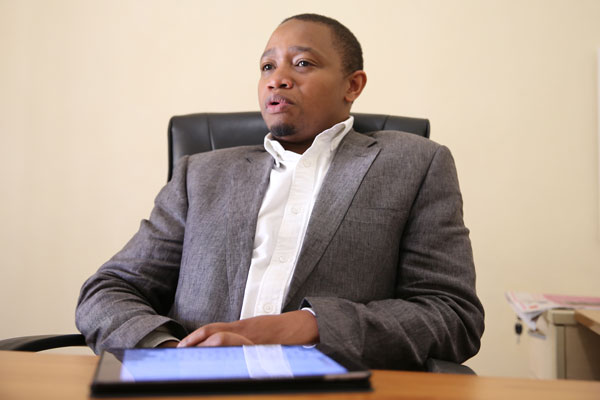
Vusi Ndebele’s curriculum vitae looks impressive; he has been involved in projects such as BBC iplayer and worked with firms in Europe and the Middle East to build online video propositions.
BY NDAMU SANDU

The entrepreneur says technology has been his daily bread and he has been involved in the business from a very young age.
With 18 years’ experience under his belt, Ndebele is now a partner at the Webdev group. He is also MD for Webdev’s fintech arm, Paynow Zimbabwe.
“I have always loved technology. It’s a very fast-paced industry and there is a good mix of the technical, commercial and business development,” he told Standardbusiness last week.
“In terms of profession, my background is infrastructure development, that is, building big service providers networks…telecoms companies or suppliers of equipment to telecoms companies.”
He moved from infrastructure development to IP video services.
“This is your technology to deliver video over the internet. I have been closely involved with projects such as BBC iPlayer and also the telecommunications in Europe and the Middle East to build online video propositions.”
- Chamisa under fire over US$120K donation
- Mavhunga puts DeMbare into Chibuku quarterfinals
- Pension funds bet on Cabora Bassa oilfields
- Councils defy govt fire tender directive
Keep Reading
Before joining Webdev as a partner in 2013, Ndebele was based in the UK between 1998 and 2013.
His experience includes working for Juniper Networks and Siemens. At Juniper, Ndebele was in charge of content and media solutions for Europe, Middle East and Africa.
He was the lead Siemens consultant for the BBC’s digital distribution.
His entry into Webdev coincided with the group expanding its presence on the online market place.
The group had been known for building websites, web applications and web hosting.
It launched classifieds.co.zw, the largest online market place in Zimbabwe, which allows merchants and individuals with goods and services to connect with potential buyers using technology.
In 2013, Webdev created a property stand-alone product, property.co.zw.
To date, 95% of registered estate agents have their properties listed on property.co.zw and classifieds.co.zw.
The registered estate agents are also using ProCloud, a property management system, which manages the entire inventory of property. Paynow was launched in 2014.
“Our background is software development and a lot of custom software development in the financial sector.
“We have done loan management systems, insurance policy management systems and payment solutions for recognised brands,” he said, adding that his company went to the market with Vpayments, a way of transacting online with Zimswitch cards.
The merchants said the product did not meet their needs and wanted to know what they were going to do with customers who were not on Zimswitch-connected banks and those in the diaspora who wanted to use Visa and Mastercard.
The merchants said the product covered a very narrow segment and it required the merchant to go and negotiate with the banks for Visa and Mastercard and separately for EcoCash, Telecash, One Wallet and GetCash.
“It’s unsustainable because for each of these relationships, it required separate commercial arrangements and they needed to integrate their systems with each of those payment channels. Paynow came about as an idea to address those issues,” Ndebele said.
“We will be an aggregator. We will sit between the merchant and the payment channel and we will work with the merchant to integrate their systems and business processes such that they only have to do that exercise once and they only have to have a single commercial agreement with Paynow.”
Paynow has connected merchants to payment channels such as Visa, Mastercard, EcoCash, Telecash and Zimswitch.
Work is underway to connect merchants to One Wallet, GetCash, Paynet online and Union pay International.
“When we add those channels, our merchants don’t have to do anything to take advantage of them,” Ndebele said.
“The key benefit for merchants is that we settle their funds everyday and directly into their bank accounts.
“This means money may have come in via EcoCash, Telecash, One Wallet, Visa or Mastercard — it all goes to their nominated bank account. So they don’t have to worry about having pools of funds sitting in different places that they can’t use.”
The aim, Ndebele said, was to be a one-stop shop for regular bills.
“We built that as an example of the power of online payments. We are now the centre of e-commerce in Zimbabwe; we now have 2 600 Paynow merchants whom we assist in integrating their businesses to be able to sell products online, or to make payment more convenient for their customers,” he said.
Despite the growth, Ndebele said there were challenges relating to a lack of willingness to cooperate and develop an ecosystem.
“Mobile operators are licensed to connect the public and we as businesses rely on that infrastructure.
“The problem comes about when the mobile operators believe those members of the public are their customers alone and make it difficult for other businesses to reach those consumers,” he said, adding that the unwillingness by mobile operators to cooperate was no longer on technical but commercial reasons.
“So we would want the regulator to mediate the conversation between businesses that are willing to do that and the operators.”
Ndebele said his group “enjoys working with businesses that have different core competencies; established businesses that are trying to navigate this digital world”.
“We enjoy working with open-minded clients that realise that their industry is ripe for disruption and they would rather come and address that early than finding themselves without a business,” he said.
Webdev has a staff compliment of 40. Of those, eight are at Paynow.











